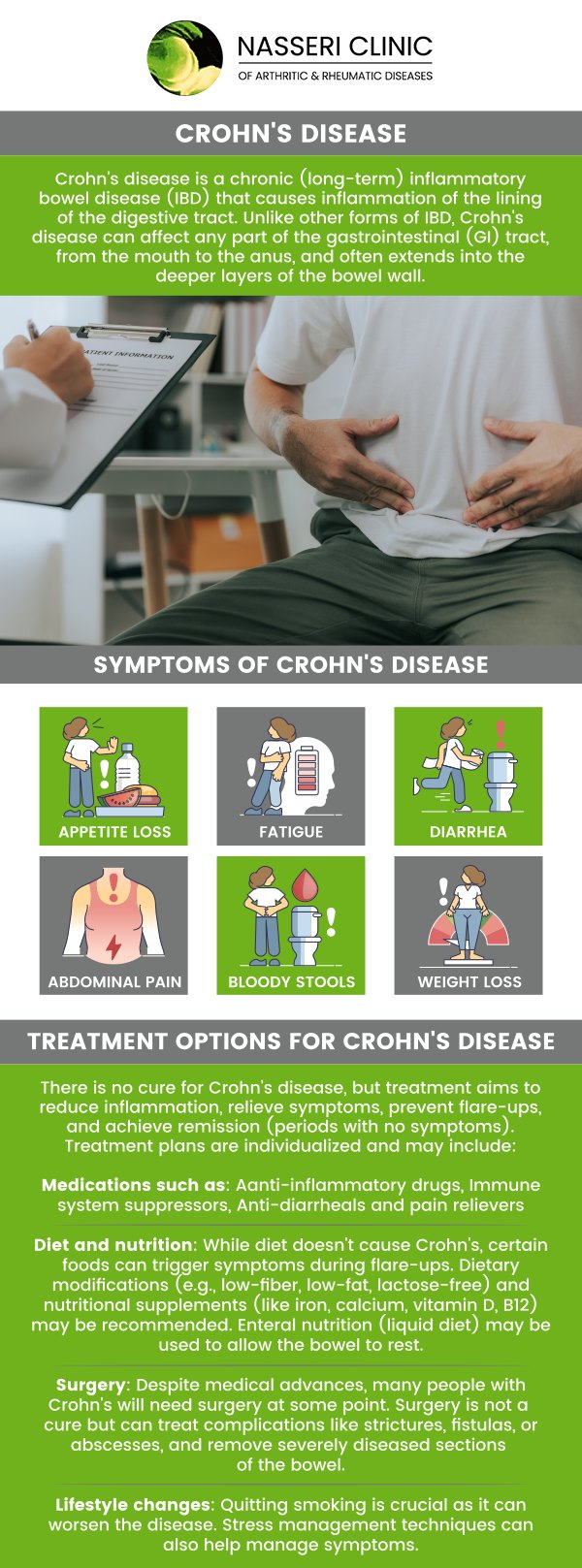Crohn’s Disease Treatment Specialist in Rosedale MD
Crohn’s disease is a chronic inflammatory condition of the gastrointestinal tract, manifesting in symptoms like severe diarrhea, abdominal pain, and weight loss. It can affect any part of the digestive system, and its severity varies among individuals. Dr. Nasser Nasseri, MD, and our team specialize in tailored treatments aimed at reducing inflammation, controlling symptoms, and achieving long-term remission, which may include medication, lifestyle adjustments, and surgery. For more information, contact us or visit us online to book an appointment! We are located at 9114 Philadelphia Rd, Ste 208, Rosedale MD 21237.




Table of Contents:
How is Crohn’s disease diagnosed?
Is there a cure for Crohn’s disease?
What is the immune system’s role in Crohn’s disease?
What happens to your body during a Crohn’s flare-up?
When diagnosing Crohn’s disease, healthcare providers rely on medical history, physical examinations, and various diagnostic tests. The diagnostic process begins with a detailed discussion of the patient’s symptoms, family history, lifestyle, and general wellness.
During the initial consultation, the healthcare professional will conduct a thorough physical exam, looking for signs of Crohn’s disease, such as abdominal tenderness. Often, blood tests are ordered, as they can reveal anemia, inflammation markers, or infections. In addition, stool tests are used to rule out other causes of gastrointestinal symptoms, such as infections or parasites.
Endoscopic procedures, such as colonoscopy or sigmoidoscopy, are used by doctors to visualize the inside of the colon and small intestine. During these procedures, small tissue samples may be taken to look for signs of inflammation, granulomas, or other characteristic changes of Crohn’s disease under a microscope.
As doctors use a variety of tools to accurately diagnose the source of symptoms, it may take a few days to weeks to receive a definitive Crohn’s diagnosis. If your primary care doctor suspects you have Crohn’s disease, they will refer you to a specialist to confirm the diagnosis through endoscopic procedures and manage your symptoms effectively.
Although a cure for Crohn’s disease has not yet been found, there are numerous treatments available to manage the symptoms of this chronic condition, reduce inflammation, and improve the quality of life for patients. Common treatments for Crohn’s disease include:
• Medications – Anti-inflammatory drugs, immunosuppressants, steroids, or biologics may be prescribed by your doctor to reduce inflammation and alleviate your discomfort.
• Lifestyle changes – Regular exercise, stress management, a balanced diet, and smoking cessation are crucial for preventing flare-ups and successfully managing Crohn’s disease.
• Bowel rest – To allow the intestines to heal, your gastroenterologist may place you on bowel rest, which means only drinking certain liquids or receiving your nutrients through an IV. Bowel rest can be administered at in-patient clinics or, in some cases, at home under medical supervision.
• Surgery – In severe cases of Crohn’s disease, where medications and lifestyle adjustments do not provide sufficient relief, surgery may be necessary. Strictureplasty, bowel resection, and proctocolectomy are surgical procedures that are commonly performed to address this condition.
In Crohn’s disease, the immune system mistakenly targets the digestive tract, causing chronic inflammation. Usually, the immune system protects the body from harmful invaders like bacteria and viruses. However, in Crohn’s disease, it becomes highly dysregulated.
The ongoing immune response causes continuous inflammation, which leads to the symptoms of Crohn’s disease such as abdominal pain, diarrhea, and weight loss. The inflammation can affect different layers of the bowel wall and can occur anywhere along the gastrointestinal tract.
During a Crohn’s flare-up, the immune system becomes hyperactive, leading to increased inflammation in the gastrointestinal tract. This heightened immune response can cause a variety of symptoms, such as:
• Inflammation – The immune system attacks the digestive tract, causing the lining of the intestines to become inflamed and swollen.
• Abdominal pain and cramping – Inflammation can lead to significant discomfort, with pain often centered in the lower right abdomen. The severity of the pain can vary, but it is often described as sharp and cramp-like.
• Diarrhea – Inflammation in the intestines can disrupt the absorption of water and nutrients, leading to frequent, urgent, and often watery bowel movements.
• Fever – The body’s inflammatory response can cause fever and night sweats.
• Fatigue – The body’s constant state of inflammation and the malabsorption of nutrients can lead to severe fatigue.
• Weight loss – Due to decreased appetite, malabsorption of nutrients, and diarrhea, significant weight loss can occur during a Crohn’s flare-up.
Managing Crohn’s disease effectively requires a comprehensive and personalized approach to care. Our experienced team is committed to providing you with the support, treatment options, and resources needed to control symptoms and maintain remission. Reach out to us to learn more about how we can help you manage your Crohn’s disease and improve your quality of life. For more information, contact us or visit us online to book an appointment! We are located at 9114 Philadelphia Rd, Ste 208, Rosedale MD 21237. We serve patients from Rosedale MD, Parkville MD, Middle River MD, Rossville MD, Overlea MD, and surrounding areas.
Check Out Our 5 Star Reviews


Additional Services You May Need

Additional Services You May Need
▸ Arthritis Care
▸ Infusion Therapy
▸ Lab Services
▸ Radiology
▸ NCARD NRACE
▸ BioFlex Laser Therapy
▸ Ultrasound Guided Injection
▸ NCARD PRP
▸ NCARD Myers
▸ Rheumatology
▸ Myositis
▸ Osteoporosis
▸ Ulcerative Colitis
▸ Multiple Sclerosis
▸ Saphnelo Infusion
▸ Injection Treatments
▸ Intravenous Immunoglobulin Therapy
▸ Asthma
▸ Crohn’s Disease
▸ Fibromyalgia
▸ Infusion Therapy for Gout
▸ Inflammatory Eye Disease
▸ Inflammatory Skin Disease
▸ Vasculitis
▸ Iron Deficiency
▸ Lupus


